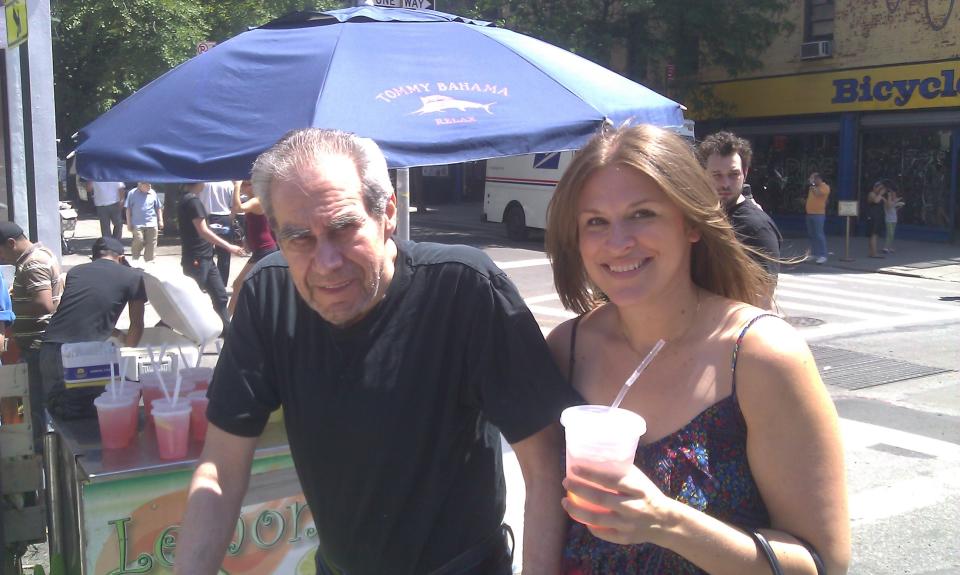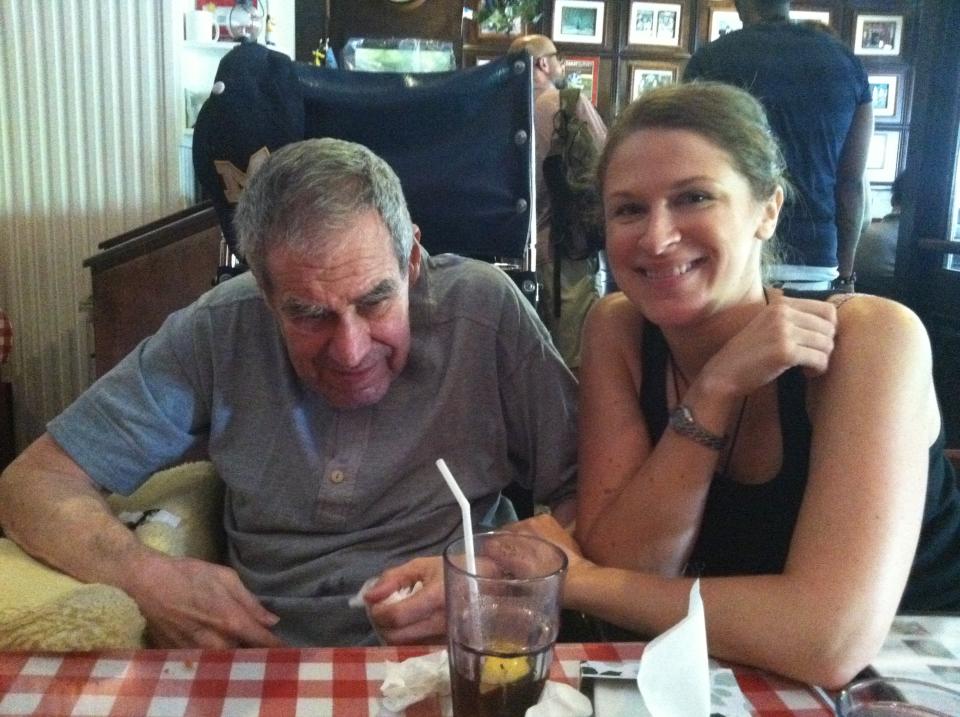I Became My Father's Parent at 32

My friends didn’t know about the paper bibs I kept in my purse. When they looked at my Instagram feed, they saw airplane wings and a dreamy sunset. "LAX to JFK." They heard about meals I had with my parents, over-indulging on the NY pizza and bagels I always missed in LA.
The bibs were for my dad. His now-weakened mouth muscles stained his shirts in drool. The airplane picture was not the highlight of my trip to New York. That would be my dad's confident smile when he broke his speed record on the exercise bike as I encouraged him to go just a few more minutes. Lunches with my dad were precious, but I spent most of the meal cutting his food and helping him to grip the fork.
My friends knew my dad was the Ladies' Man of the nursing home and that he had a disease “like Parkinson’s.” They didn’t know his neck muscles had become so weak his chin was almost always against his chest, that I'd have to rub his tight neck looser so he could lift his face enough to look me in the eyes when we spoke.
They didn’t know that, in a sense, I’d become my father’s parent.
It was February 2013, two weeks after my 32nd birthday, when I got the call from my mom. My dad had fallen in the bathroom of his assisted living apartment in New York. He would need a wheelchair and round-the-clock supervision, more than his current facility could provide. I lived across the country in Los Angeles, so my mom, his ex-wife of 20 years, had joined him in the ER, but I, his only child, needed to get there.
As I dealt with the lonely weight of deciding on his living arrangements and analyzing his insurance, I'd never craved siblings so badly.
The call was upsetting but not totally surprising. A couple of years earlier, my father - a walks-for-miles New Yorker - had begun falling a lot. My dad dismissed the pattern until he noticed his thinking becoming foggy. When he was 78, about a year after symptoms started, he was diagnosed with a nasty degenerative brain disease called Progressive Supra-Nuclear Palsy (PSP), which affects only 3 to 6 people in every 100,000 worldwide. It deteriorates certain areas of the brain and weakens muscles, affecting walking, speech, vision, and swallowing until you're incapacitated completely. Frustratingly little is known about the condition and currently there's no cure.
Being an only child is great, but as a kid, you don’t really think about the fact that one day you’ll be solely responsible for your parents' well-being. Suddenly, much earlier than expected, I was. After the call from mom, I booked a flight to New York and spent a whirlwind weekend shopping for nursing homes. My life then became a juggling act between two coasts - between the life I was building for myself and the life I was trying to keep going for my dad. As I dealt with the lonely weight of deciding on his living arrangements and analyzing his insurance, I'd never craved siblings so badly.
Related:
For more news videos visit Yahoo View, available now on iOS and Android.
I was named my father's healthcare proxy - law now dictated I was the one to call the shots if my dad couldn't. I spent free moments memorizing my father’s medical history to quickly fill out patient forms, calling his doctors, researching PSP online, and paying medical bills. Visits home were spent almost entirely with him, quality time punctuated by doctor appointments and pangs of paranoia that the other shoe was about to drop. I got used to daily life interrupted - my phone's ringer was never off "just in case" - and when I saw a New York number I didn't recognize, my insides would steel.
Trying to assert any authority over my dad, who I once called from 3,000 miles away because I had a flat tire, was ridiculous. And my skills navigating his wheelchair were downright dangerous. If the sidewalk sloped, I'd grip the rubber handles, throw my body weight back, and pray he wouldn't go flying out as I tried to veer back on course. He brushed aside any instructions I tried to impart about practicing voice exercises or strengthening his neck muscles. He found my haplessness funny - I think, for him, it made everything feel more normal. I found it endlessly frustrating.
Overwhelmed, I'd break down in my Los Angeles living room and cry to the point of screaming. I hated the moments I felt sorry for myself.
But even my inner circle didn’t know what I was going through. In addition to being protective of my father's dignity, I wanted to use time with my friends as a brief moment away from doctors and illness. I kept quiet at work too. I worried if coworkers knew about my dad's condition they'd think I was distracted. I managed to keep medical phone calls brief and behind closed doors, until one day I received an emergency phone call that my dad had been hospitalized with a serious bacterial infection. I entered my boss' office and, for the first time teary at work, explained I had to leave town immediately - and I didn't know when I'd be back. Thankfully, my boss was empathetic.

What I didn’t realize during those years I was caring for my father is how common my situation actually was. A 2015 survey by Easter Seals, a nonprofit assisting those with disabilities and special needs, found that one-third of Millennials and Gen X-ers are already caregivers for a family member. We're caring for elderly or ailing parents, veteran spouses, or mentally- or physically-challenged siblings. Like me, most of these Millennial caregivers have separate full-time jobs and don't feel ready for the long-term responsibility of a loved one's well-being. People who experience this later in life most likely have a significant number of friends who’ve already experienced, or are experiencing, parental caretaking and are willing to discuss it. That’s not the case when it happens in your 20s or 30s. And while there plenty of resources available to caregivers (like National Alliance for Caregiving and HelpGuide), the problem was, I never identified myself as one. In my mind, “caregivers” were nurses, home aides, or people older than me. I just thought of myself as a good daughter.
After more than a year of caring for my dad, my mom realized how frazzled I’d become and suggested I check out a support group, but the idea of opening myself up to strangers at a time I felt so vulnerable made me uncomfortable. I’d scroll through the message boards, reading but never participating. Still, they provided remote comfort. As my dad’s condition worsened and I was stuck in L.A., I finally confided some details to a few close friends. One friend generously volunteered to buy me a plane ticket. It wound up being one of the last visits I spent with him and something I'll never be able to repay.
Most of all, I learned that work is important, but the people in your life are everything.
The thing about caregiving is that just when you think you have a handle on it, a sudden fall or another symptom comes along, and you reel for a moment before adopting it as your new reality. The end of my dad's life was the same: we didn't see it coming, and then before we could adjust our eyes everything changed forever. He died two years ago, and I still miss him in immeasurable ways. But thinking of him, of the disease, I'm reminded of the patience and empathy he taught me in his final years. Most of all, I learned that work is important, but the people in your life are everything.
I didn’t speak to anyone my age caring for a parent until just a few months ago, when I met Lea, a 32-year-old who has been primary caretaker for both parents since 2009 in addition to raising her 5-year old son. We met through a contact at the National Alliance for Caregiving. The first time we talked, I told her about a time my dad lost his balance and fell to the floor of his apartment, and I needed to leverage him to standing. No amount of Barre classes could teach me how to summon enough strength to lift his long frame and dead weight. Lea laughed and shared her maneuver for picking up her 6-foot, 300-pound father: sliding him to a wall and pushing his feet against it for leverage. No matter how scary the reason, the visual was ridiculous, and as we laughed together, I felt light with relief. Someone understood.
Follow Jennifer on Twitter.
You Might Also Like

